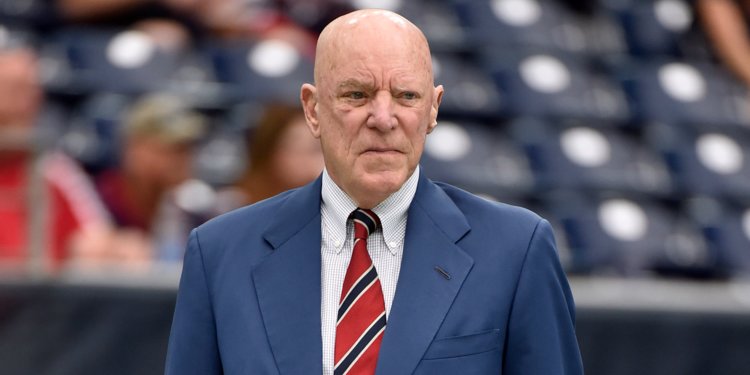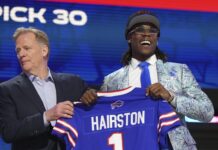
NFL.com –
Bob McNair, who made his fortune in energy plants and became one of the most powerful owners in the NFL after bringing football back to Houston, died Friday at age 81, the team announced. McNair had battled multiple types of cancer in recent years.
When McNair paid $700 million for an expansion franchise in 1999 to replace the Oilers — who had moved to Tennessee in 1997 and eventually became the Titans — it exploded the benchmark price for American sports franchises. Just six years earlier, expansion teams were awarded to Jacksonville and Carolina for $140 million each. McNair could easily afford the cost. It wasn’t always that way, though.
He was born in Tampa, Florida, and raised in Forest City, North Carolina, a small town of about 7,500 located an hour west of Charlotte. For 32 years, his father worked as an office manager and in sales for Sunshine Biscuits.
“We were a middle-class family, trying to make ends meet,” McNair once told Houston Lifestyles & Homes magazine. “We were active in our church and my parents supported the church. My mother was a homemaker, and with three boys, we kept her busy. She was the glue that held us all together.”
McNair graduated from the University of South Carolina in 1958 — he started out studying civil engineering, but switched to psychology — and he and his wife, Janice, whom he met during his freshman year during a dance at nearby Columbia College, moved to Houston in 1960.
McNair’s first job, while still in college, was selling life insurance. After college, he spent a little more than a year working for a Houston-based advertising agency selling ads to major soda-bottling companies. He briefly worked with a college fraternity brother on a start-up auto-leasing company until the business ran out of money. Then McNair started his own executive car-leasing company in Houston — although the business struggled, and he sold it in the early 1980s, leaving him close to bankruptcy.
“Many people say I was an overnight success, and I was, after 20 years of struggling,” McNair told Houston Lifestyles & Homes.
In 1984, McNair finally had his breakthrough, founding Cogen Technologies, which grew to become the largest privately-owned energy cogeneration company in the world.
During much of the 1990s, McNair sniffed around other NFL ownership opportunities in Miami, after the death of Joe Robbie, and in St. Louis.
“I was working with a major company and a man asked me what was wrong in Houston, if we could not support an NFL team,” McNair told Houston Lifestyles & Homes. “I thought this was a black eye for Houston. Then I heard the NFL was going to add expansion teams, and I thought it was important for the city, so I looked at it as a civic project.”
McNair’s bid in 1999 dwarfed that of two rivals — talent manager Michael Ovitz and financial services mogul Eli Broad — who headed separate groups that had hoped to get an expansion team for Los Angeles. As NFL owners gathered to approve McNair’s bid, McNair told the New York Times that his offer “went higher than any reasonable person would go.” But after he was approved as a new owner, McNair concluded, “I’m more than happy with the number.”
Having sold Cogen to Enron in 1999 (two years before the Enron scandal) for $1.5 billion, McNair had more than enough to pay off the debt he took on to start an NFL franchise from scratch — an undertaking that included a new stadium, new logo and all new players. And it ended up being a pretty good investment: In July of 2018, Forbes magazine estimated the Texans’ worth at $2.8 billion.
The team began play in 2002 and did not make the playoffs until 2011. The Texans have been in the postseason just four times total, never advancing past the Divisional Round — although the team is off to a fast start this season with second-year quarterback Deshaun Watson leading them to seven straight wins. Despite the team’s spotty results on the field, and the owner’s relatively low public profile, McNair’s influence on the NFL was considerable. Houston has hosted two Super Bowls since 2004 and he was the chairman of the league’s powerful Finance Committee.
McNair also owned a successful thoroughbred horse farm and stable in Kentucky, and he was head of multiple companies that oversaw the family’s investments. McNair and his wife were leading philanthropists who lent support to a wide array of organizations focused on literacy, education, religion and the sciences. Among their donations: $100 million to Baylor’s College of Medicine to recruit scientists and physicians.
In recent years, McNair had stirred controversy. He contributed to a campaign to block a local ordinance designed to broaden anti-discrimination coverage to, among others, gay and transgender residents. When the donation was publicized, McNair was on the receiving end of a stream of criticism and he withdrew the donation and backtracked.
Then, during the 2017 Fall League Meeting, as owners discussed the player protests during the national anthem, he was reported to have said, “We can’t have the inmates running the prison.” The quote became a national story and Texans players, among others, were furious, with at least two of them skipping the next practice.
McNair said the comment was referring not to players, but to league officials not listening to owners. He said the comment was “very regretful,” although several months later he told the Wall Street Journal his main regret was apologizing because he did not think he had anything to apologize for.
McNair is survived by his wife and four children — sons Cal and Cary and daughters Melissa and Ruth. Cal, the chief operating officer of the Texans, is expected to continue to run the team.
“We lost an incredible man today,” Texans president Jamey Rootes said in a statement. “Bob McNair had a positive impact on so many people’s lives. He was the reason professional football returned to Houston and he stewarded our franchise with a laser focus on honest, integrity and high character. He was an amazing champion for Houston and worked hard to make sure our city received maximum value from the presence of the Texans and the NFL. Bob gave me an opportunity 19 years ago to be part of the creation of the Texans and he became my mentor, hero and father figure. We will all miss him dearly. Our thoughts and prayers are with the McNair family during this difficult time.”
It is with deep sadness that we announce Houston Texans Founder, Senior Chairman and Chief Executive Officer and philanthropist, Robert C. McNair passed away peacefully in Houston today with his loving wife, Janice, and his family by his side. pic.twitter.com/7J9PWoxKZv
— Houston Texans (@HoustonTexans) November 23, 2018









